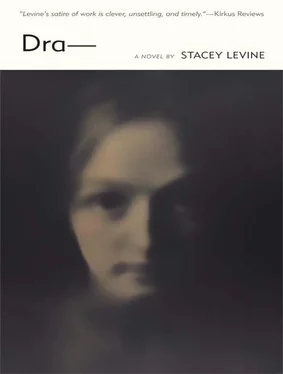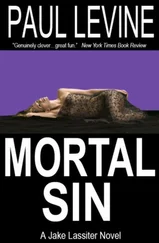“Oh, shit on the feelings!” cried the Lecturer. “We don’t have time; or we do, but we’re not matched well to the time we have. Tonight, we’ll all be exhausted, dammit, and we still have to catch the late train!” He shut his eyes and placed his fingers at his temples for a moment. “Now that all this nonsense has arisen, I must address it,” he said, stepping in front of the group, smoothing his hair, and Dra—, worried, dared not look at anyone but him. He spread his hands slowly and looked at the group assembled before him in the hallway, saying, “It’s true that the feelings are uppermost in Nanny’s mind — but that’s only because her illness is worsening and time may be short. Let me go back and speak about the illness for a moment now, since it will come to you all someday. If,” he said, eyes scanning the quiet group, “you look at this woman closely, you’ll be able to discern which stage of the disease she’s in, one, two, three, four, all the way up to ten! Can you? I can, just by looking at her.” He turned to Dra—. “At least talk with her, why don’t you? You wouldn’t want to be responsible for making her spirits fall. Keep her spirits high, why don’t you,” the Lecturer said, turning back to the group, “because inner attitude may affect the body — the news always says so, though we’ll never really know if it’s true or not. Personally, I don’t think a person’s spirits really affect their health — doesn’t death take us all the same, no matter what mood we’re in?” He stepped back and looked at Dra—. “Oh, come along, just tell Nanny what she wants to hear!”
Nanny, seeming not to listen, railed on, “We’ll get the feelings out of her, I know it. Do you think I’m the only one who’s going to be vulnerable? Don’t you see there’s something wrong with her? The way she lives … it’s just sick-making! Why isn’t she hard at work, analyzing herself and trying to change? Well, let me tell you a little secret, Missy. If you run away from feelings, they will only come back later and kill you with their truth.”
“The truth is always somewhere,” mused the Lecturer.
“Can we sit down?” asked another woman, Buzzy, eyes rolling, bored, hand pressed to her face.
Dra— cried out to Nanny, “I can’t talk about those things now — the whole group is listening!”
“Exactly!” Nanny yelled. “I had to speak about my feelings to a group — and so should you, every Wednesday!”
Anxious, at a loss, Dra— scanned the hallway, seeing that its length prohibited a quick escape, and as Nanny angrily reached out with a diminutive hand, perhaps trying to grasp Dra—’s shoulder, the Lecturer remarked, “When does contact become attack?” and ushered the class through a small doorway behind them.
They all shuffled through a short stone passageway in silence, until Nanny cried past the others toward Dra—, “Can’t you see I’m trying to help you? Stay with me, and let me show you I get excited sometimes and then I yell and condemn because I have such keen senses, you know, but that’s my lot, to have keen senses; come, stay with me a while, won’t you? I hardly speak to a soul, these days! Don’t they say that speaking is a lost art? Well, it is for me. Did you know that about your old teacher? That she is all alone and much too defensive even to look a stranger in the eye or strike up a bland conversation on a train?”
“No,” answered Dra— flatly over the others’ heads as they moved along.
“Tell me about you,” Nanny called out to her. “Who are you, these days? What about your feelings? Once, you had feelings for me.”
“I don’t remember!” she cried.
“Liar!” Nanny yelled. “God, why don’t things come easy for me? What do I have in the world, at my age? What was I doing when I was younger, wasting all my time? And now, I don’t have time!” Her voice quavered.
“Be quiet, Nanny,” the Lecturer said sharply, striding ahead of the group. “Why is life always so unbearable for you? Do you think perhaps we should examine that issue before you die?”
“I only want to have what I once had! I want to smash the present, I want to go back to the past,” Nanny cried. “And I want you to acknowledge that that is a natural, human need.”
Dra— moved away from the group, softly passing through a small doorway to her left. Hearing the Lecturer’s angry reply fading behind her, she considered that Nanny’s behavior was to be expected, after all, because, as the Lecturer had put it, Nanny was not a well woman.
Nanny called out for her, but Dra— already had made headway through a low, tunnel-like hallway, only once glancing back through the doorway at Nanny, who was lurching around weakly, yelling in a thin, failing voice as the group stared stonily behind her, “Look there, she’s leaving her old teacher, just like that — and why? There’s no reason for it. Look, she leaves. Don’t!” she cried. “When you’re older, you’ll want all the fondness in the world, and eye-contact too — you won’t be able to have it, either, believe me, not unless you can accept it right now from someone who knows you better than anyone else in the world and if you wait too long to accept contact, you’ll be ruined! Why, even now, your face is ruined by tiny eye-wrinkles, and the rest will be ruined soon, believe me!”
But Dra— was now stealing away in wide strides, powered by the momentary strength of nervousness; and as the sound of Nanny’s voice faded, she noted, as if from far within herself, how easy it had been to walk away, though usually she was not able to do so.
Presently, as she walked, a terrible, meandering ache arose in her back, so she found a stair landing and sat on its cold cement to rest, shunting from her mind all thoughts of Nanny, the training group, and the entire previous hour as best she could.
She turned a keen attention to the back-pain: it seemed familiar. The sensation was often vague, and it moved; the pain was perhaps best described as a shadow, and it sometimes took on the shape of a spider, with spokes of sensation expanding from a center. It was a worrisome pain, and one, she realized, that demanded she see a doctor right away.
Rising wearily, she headed into a hallway perpendicular to the previous one, shakily telling herself that she must do two things: never again think of Nanny, and find a doctor. This last was especially important, and it would take only a few minutes of her time. Doctors, she knew, could eliminate even the most mysterious and sudden of pains, and so she hurried to find a telephone.
Naturally she would call Doctor Jack Billy, she thought, walking more confidently now; who else would it be but Dr. Billy? She had known him all her life, though for some reason it was impossible to recall his face right now. She had no memory of meeting him, either — instead, it seemed she had known him gradually and always, the absent-minded doctor of long silences and sudden grimaces, the one who breathed seriously through his nose, puffing; though long retired, he still saw patients. In the distant past, there had been a period of time when Dra— thought of him to the exclusion of everything else, and she still carried with her a photo of the two of them together, he and she, taken after a routine exam. As it happened, Dr. Billy possessed the unusual power of being able to put himself exactly into another person’s position, to the point that, if only for a few moments, he could become nearly the same as anyone he wanted. In this way, he was able to speak as if he were any number of absent colleagues, and give second or third opinions; and with his easy smile and long, colorless hair, he could really resemble anyone at all, so frequently he gave fourth and fifth opinions as well.
Smiling now with these thoughts, she began to run through the hall, enthused, looking out avidly for a telephone so she could phone him, despite the lateness of the hour; and she recalled his trait of laughing mirthfully for long moments with no clear reason, then abruptly growing sour. She thought also of Dr. Billy’s rather large stable of patients, a virtually endless list that expanded and contracted variously over the years while remaining steadily huge, a list full of people she would never know — and suddenly she felt ripe, agonizing jealousy rush into her chest and she yelled out sharply once, imagining herself falling hard on the tile floor again and again.
Читать дальше












